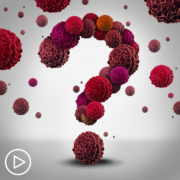How Have Advances in Testing Impacted AML Care?
How Have Advances in Testing Impacted AML Care? from Patient Empowerment Network on Vimeo.
Recent testing advances have dramatically improved care for AML patients. Dr. Ann-Kathrin Eisfeld discusses these improvements and why every AML patient should undergo in-depth molecular testing before making a treatment choice.
Dr. Ann-Kathrin Eisfeld is Director of the Clara D. Bloomfield Center for Leukemia Outcomes Research at The Ohio State University and a member of the Leukemia Research Program at the OSUCCC – James. Learn more about Dr. Eisfeld.
Related Resources:

|

|

|
Transcript:
Katherine Banwell:
Dr. Eisfeld, the landscape of AML has changed significantly in recent years. How have advances in testing improved patient care?
Dr. Eisfeld:
It is a different world, Katherine, honestly. I mean, I started practicing in hematology in taking care of AML patients back in Germany actually in the year 2007.
Back then, there was no other testing that was available. All we were guiding and all that we had available was morphology and cytogenetics
And very often, it was very inaccurate. And we also only had two treatment kinds available. One was intensive chemotherapy, and one was something that was just a little bit better than best supportive care. So, many patients could not receive treatment. And the increase in knowledge that we have on a molecular level in AML really did two things at once. On one, we understood we had a more finetuned understanding on which patients would respond. And the second thing is that this knowledge about the molecular landscape enabled us to have new treatments available that are sometimes in pill form that can target specific mutations in patients who carry these genetic changes.
Katherine Banwell:
Should all AML patients undergo in-depth testing like biomarker testing or cytogenetics?
Dr. Eisfeld:
Yes. Every patient should do that. It can make the difference between life and death. And it can make the difference between receiving – having a hospital stay of four weeks with intensive chemotherapy versus taking the pill at home. This is very rare that this is possible. But it is possible. And of course, you – one would not want to miss this chance if it would be possible.
Katherine:
I’d like to get your thoughts on where we stand with progress in the field of AML. What would you like to leave the audience with? Are you hopeful?
Dr. Eisfeld:
I am incredibly hopeful. I hope – when I started working in hematology, as I said at that time, it was just about when imatinib (Gleevec) came out. Which is this CML pill that really revolutionized care. And so, at that time, I would be – all patients on that bone marrow transplant service had chronic myeloid leukemia. And because they all had to undergo bone marrow transplant. Then Gleevec came, and today, there are no such patients who are see or very rarely that require such intensive care.
So, I am very hopeful that in my practice time, which hopefully –and even earlier on – that there will be a time where we find targeted therapies for almost all patients.










